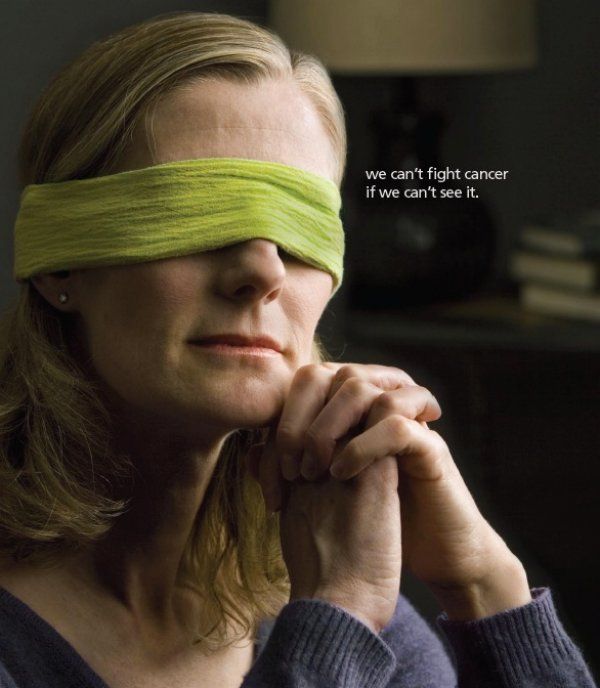
The American Cancer Society has just launched a new nationwide print and online ad campaign to raise funds for a program that screens disadvantaged women for breast and cervical cancer. This does not sound controversial until you look at one of the ads. This morning, it had health-media critic Gary Schwitzer upset, and rightly so: it's so vague that it can be read as cheerleading for all types of screening and promoting medical practices that aren't supported by science.
The original ad, which you can see below, is intended to raise funds for a laudable effort by the Centers for Disease Control, its National Breast and Cervical Cancer Early Detection Program. According to a press release for the ad campaign, the program is short of funding and can afford to help only about one in five women who are eligible for its services. The press release also notes that "the program has provided more than 9 million screening exams to more than 3 million women and diagnosed more than 40,000 cases of breast cancer and more than 2,000 cases of cervical cancer since it launched in 1990."
This is powerful stuff. Alas, the ad simplifies it and takes it out of context to the point of near-inaccuracy. Here, see for yourself:

The information about the CDC program is squeezed into one sentence ("fewer than 1 in 5 eligible women have access to breast cancer screenings through a program with a 20-year record of success") tucked into the middle of the text. Readers are more likely to notice the ad's enormous photo of a blindfolded woman and its short, punchy slogans: "We can't fight cancer if we can't see it." "Screening is seeing." "It's time to take the blindfolds off." As Schwitzer notes, "the ad promotes unspecified screening—all screening, one could infer ... Are we talking about prostate cancer screening? Lung cancer CT scan screening? Ovarian cancer screening? Show me where it does NOT say that."
This matters, because in some cases—prostate-cancer screening based on PSA levels and mammograms for women under 50 being the most prominent examples—it's unclear who should get screened and how great the benefits or harms for an individual may be. Yes, screening is a way of seeing, but with some techniques and diseases, it can be a little like peering through smudged glasses. An imperfect cancer-screening tool may identify "tumors" that turn out to be nothing to worry about—in medical parlance, it's not specific enough. Or it may miss tumors that really are cause for concern—it's not sensitive enough. (For a guide to which medical screenings may be worth getting for you, check out our recent Healthy Living package. And for a further illustration of sensitivity and specificity in action, read this analysis of recent claims that a new Alzheimer's test was "100 percent accurate.")
The ACS surely didn't mean to promote misconceptions about cancer screening. The literature on its Web site offers pretty clear guidelines for who should get screened when. But this ad could easily lead people to think they should get as many screens as possible, as often as they can, and that's the kind of thinking that leads to possible medical harm and high health-care costs. The ad ought to be a little more, well, specific. Maybe something like this?

UPDATE: On Thursday afternoon, Schwitzer's blog reported that the American Cancer Society has decided to pull its ad. Schwitzer writes, "The spokesperson said, 'It would be unfortunate if, in trying to raise awareness about this critical issue, a brief, powerful message in the ad became the story rather than the issue itself.' It has become clear to me within the last 24 hours that the ad was not universally embraced within the American Cancer Society and that there was significant agreement with the stance I took in criticizing the ad."
Uncommon Knowledge
Newsweek is committed to challenging conventional wisdom and finding connections in the search for common ground.
Newsweek is committed to challenging conventional wisdom and finding connections in the search for common ground.
About the writer
To read how Newsweek uses AI as a newsroom tool, Click here.





